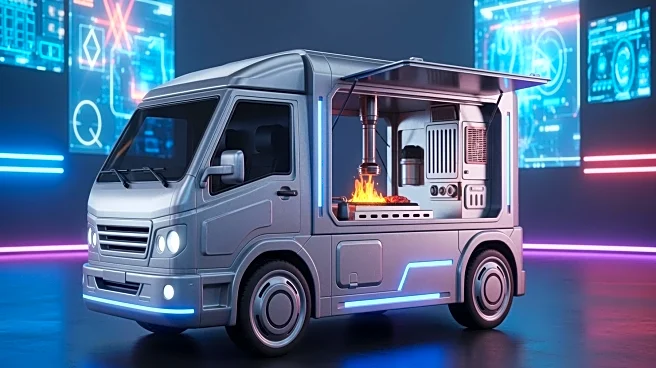What's Happening?
Shin Starr, a company specializing in autonomous kitchen technology, is set to showcase its robotic food truck at TechCrunch Disrupt 2025. The truck, named OLHSO, will serve Korean BBQ using an AI-powered
system called 'Autowok' that automates cooking, serving, and cleaning. The system is designed to cook meals en route, ensuring freshly prepared dishes upon arrival. The truck's culinary operations are led by Han Sungil, a chef with extensive experience in Korea. Shin Starr aims to expand its technology into airports, offering 24-hour service without human staffing, addressing the lack of food options during late-night hours.
Why It's Important?
The introduction of Shin Starr's robotic food truck represents a significant advancement in automated culinary technology, potentially transforming food service in high-traffic areas like airports. By providing fresh, high-quality meals around the clock, the technology could disrupt traditional food service models, offering convenience and efficiency. This innovation may benefit travelers and businesses by reducing labor costs and increasing operational hours. The success of Shin Starr's technology could pave the way for broader adoption in other sectors, such as hotels and hospitals, where demand for quality food service is constant.
What's Next?
Shin Starr plans to open a micro restaurant in a leading California airport, testing its technology's viability in a real-world setting. If successful, the company intends to expand to other airports and potentially other venues like hotels and college campuses. The upcoming showcase at TechCrunch Disrupt 2025 will provide an opportunity for Shin Starr to demonstrate its technology to potential investors and partners, potentially accelerating its growth and adoption in various industries.
Beyond the Headlines
The deployment of robotic kitchens raises questions about the future of food service jobs and the ethical implications of automation in the culinary industry. While the technology offers efficiency and convenience, it may also lead to job displacement for traditional food service workers. Additionally, the reliance on AI for food preparation could spark discussions on food safety and quality control, as well as the cultural impact of automated cooking on traditional culinary practices.









